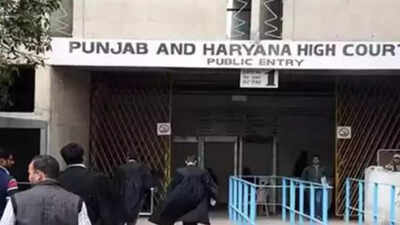- News
- City News
- chandigarh News
- Even if summons refused, would be presumed served: Punjab and Haryana HC
Even if summons refused, would be presumed served: Punjab and Haryana HC

Punjab and Haryana high court (Image credit: Agency)
CHANDIGARH: The Punjab and Haryana high court has made it plain that if a person refuses to receive summons in a case, it would be presumed that the summons have been validly served to that person. And even if fresh notice has been issued in that case, it would be presumed that he has been served in view of the old report regarding refusal of first summons.
Justice Sudhir Mittal of the HC has passed these orders while dismissing an appeal filed by Davinder Singh and others from Punjab, parties in an application for partition of joint land. As per the petitioners the proceedings on partition of that land were concluded without effecting service upon them and, thus, the ‘sanad’ (deed) was challenged by way of an appeal. The appeal was dismissed by the concerned revenue court as being not maintainable.
Thereafter, a revision petition was filed by the petitioners before the financial commissioner, which holds revenue court in Punjab, but this was rejected by recording a finding that service was in fact deemed effected upon the petitioners as there was a report of refusal.
Aggrieved from the orders, the petitioners had approached the high court. Counsel for the petitioners submitted that on August 27, 2010, a report of refusal was in fact given, but fresh notices were issued. Whether service was effected after fresh notice was issued or not is not evident from the record and, thus, the financial commissioner was in error in rejecting the revision petition, the counsel had argued before the high court. After hearing the petition, the court observed that the argument is misconceived. “Refusal to receive summons amounts to valid service and, thus, the order of the financial commissioner cannot be faulted,” observed the judge while dismissing the petition.
Justice Sudhir Mittal of the HC has passed these orders while dismissing an appeal filed by Davinder Singh and others from Punjab, parties in an application for partition of joint land. As per the petitioners the proceedings on partition of that land were concluded without effecting service upon them and, thus, the ‘sanad’ (deed) was challenged by way of an appeal. The appeal was dismissed by the concerned revenue court as being not maintainable.
Thereafter, a revision petition was filed by the petitioners before the financial commissioner, which holds revenue court in Punjab, but this was rejected by recording a finding that service was in fact deemed effected upon the petitioners as there was a report of refusal.
Aggrieved from the orders, the petitioners had approached the high court. Counsel for the petitioners submitted that on August 27, 2010, a report of refusal was in fact given, but fresh notices were issued. Whether service was effected after fresh notice was issued or not is not evident from the record and, thus, the financial commissioner was in error in rejecting the revision petition, the counsel had argued before the high court. After hearing the petition, the court observed that the argument is misconceived. “Refusal to receive summons amounts to valid service and, thus, the order of the financial commissioner cannot be faulted,” observed the judge while dismissing the petition.
FOLLOW US ON SOCIAL MEDIA
FacebookTwitterInstagramKOO APPYOUTUBE
Looking for Something?

Start a Conversation
end of article
Visual Stories
Quick Links
Azam KhanDelhi TemperatureChennai WeatherBangalore TemperatureVismaya Dowry Death CaseCoronavirus in DelhiRTPCR test in GurgaonHyderabad RainPollution level in BangaloreDelhi SmogDelhi TemperatureNoida AQIGurgaon AQI todayFire in MumbaiMumbai RainsCovid 19 RT PCR Test in NoidaDelhi AQI todaySrinagar encounter

